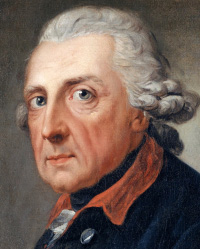On this date in 1712, Frederick II, future king of Prussia, was born in Berlin to Frederick William I and Sophia Dorothea of Hanover. Frederick endured a severe military education at the hands of his unsympathetic father, who once beat him publicly when he was 18. Frederick was forced to witness the execution by decapitation of a friend with whom he had planned an escape from Prussia.
When Frederick ascended the throne in 1740, he instituted many domestic reforms, including the promotion of education and the arts, improved infrastructure, the creation of new industries and, while he was largely irreligious, the enforcement of universal religious toleration.
He was prey to a violent temper, in part due to porphyritic illness, a nervous system condition that may have led to him being dubbed “the enlightened despot.” Under his sway, his court was turned into an international hub of Enlightenment and culture. He had married Elisabeth Christine of Brunswick-Bevern in 1733, an arranged union. He was widely believed to have been gay. Frederick and Elisabeth saw little of each other during his reign but remained married until his death. He corresponded for 40 years with Voltaire.
By the time he died, he had doubled the size of his country. Frederick was the first to codify German law and he reformed the criminal codes and abolished torture. While holding absolute power, he dedicated himself as “first servant of the state” and modernized Prussia. His collected writings fill 31 volumes. He died at age 74. (D. 1786)


